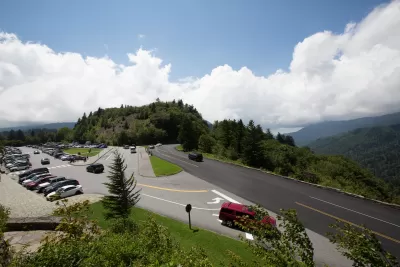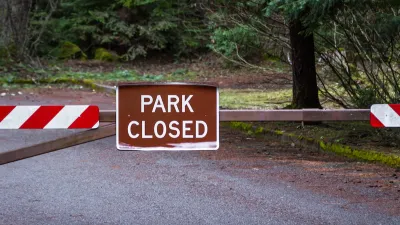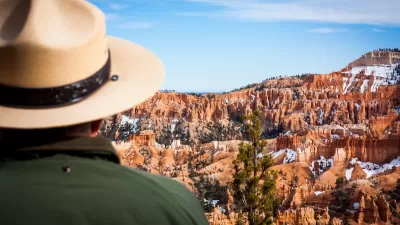The Great Smoky Mountains National Park, the nation's most visited and one of only a handful with no admission fee, could institute a parking fee to pay for much-needed maintenance.

Updated August 15, 2022 to more accurately reflect the status of the proposal at the time of this article. The parking fee plan was proposed in April but not approved until August 2022.
Elizabeth Sims reports on big changes that could be coming to the Great Smoky Mountains National Park, which may start charging for parking to raise revenue for park maintenance in the nation's most popular national park. "With 4,500 parking spaces in the park, the projected revenue gain would be around $10-15 million per year." Parking tags would be available at daily, weekly, and annual rates. "Officials said unofficial roadside parking would be eliminated to help protect resources, improve motorist and pedestrian safety and improve traffic flow through congested areas."
As Sims notes, "In its current state of operation, the Great Smoky Mountains does not have a fee or robust concessions to boost revenues outside the park. Officials said the lack of concessions was by design and has been a successful model with $50 returned to the region for every $1 of federal investment."
Because of deed restrictions on park roads, unlike a parking fee, instituting an entrance fee would require action by the Tennessee state legislature. "The last major infrastructure upgrades came in the 1930s and 1960s, meaning wastewater treatment and freshwater sources are beyond their life cycle. The strain on park employees, infrastructure and natural resources isn’t sustainable despite the dedicated funding of the Great American Outdoors Act."
The park also wants to increase backcountry camping fees and standardize other campsite fees across the park.
FULL STORY: Pay to park: Sweeping changes in the Great Smoky Mountains

Alabama: Trump Terminates Settlements for Black Communities Harmed By Raw Sewage
Trump deemed the landmark civil rights agreement “illegal DEI and environmental justice policy.”

Planetizen Federal Action Tracker
A weekly monitor of how Trump’s orders and actions are impacting planners and planning in America.

The 120 Year Old Tiny Home Villages That Sheltered San Francisco’s Earthquake Refugees
More than a century ago, San Francisco mobilized to house thousands of residents displaced by the 1906 earthquake. Could their strategy offer a model for the present?

Record Temperatures Prompt Push for Environmental Justice Bills
Nevada legislators are proposing laws that would mandate heat mitigation measures to protect residents from the impacts of extreme heat.

Downtown Pittsburgh Set to Gain 1,300 New Housing Units
Pittsburgh’s office buildings, many of which date back to the early 20th century, are prime candidates for conversion to housing.

Trump Administration Could Effectively End Housing Voucher Program
Federal officials are eyeing major cuts to the Section 8 program that helps millions of low-income households pay rent.
Urban Design for Planners 1: Software Tools
This six-course series explores essential urban design concepts using open source software and equips planners with the tools they need to participate fully in the urban design process.
Planning for Universal Design
Learn the tools for implementing Universal Design in planning regulations.
Clanton & Associates, Inc.
Jessamine County Fiscal Court
Institute for Housing and Urban Development Studies (IHS)
City of Grandview
Harvard GSD Executive Education
Toledo-Lucas County Plan Commissions
Salt Lake City
NYU Wagner Graduate School of Public Service





























